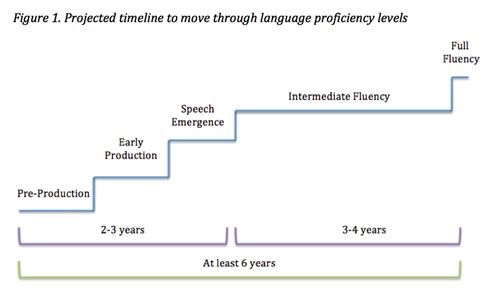Behind the headlines: What the research says about English Language Learners and fluency
8/29/2014
Latest News:
Florida Receives Positive News for English Language Learners
On Wednesday, Governor Rick Scott, Education Commissioner Pam Stewart, and Miami-Dade Superintendent Alberto Carvalho held a press conference in Miami to call on federal officials to reconsider testing rules for English Language Learners.
The U.S. Department of Education says the standardized test scores of an English Language Learner must count after the student has enrolled in a school in the United States for one year. In the past, the policies, both at the state and national level, have allowed two years before scores count for these students, which education stakeholders have considered more reasonable, considering many of these students are learning English for the first time.
According to research, it takes at least six years for English Language Learners to become fully fluent with the English language. Although the amount of time varies based on the individual student, it is apparent that the amount of time exceeds the single year expectation set by the U.S. Department of Education.
Florida initially agreed to the one-year restriction in order to receive an exemption from the No Child Left Behind (NCLB) law, requiring every student in the state to pass statewide exams, or receive penalties. This spring, however, the state legislature passed a law reverting back to the two years originally used across the state.
The legislation could put Florida at risk to have their exemption request denied from the NCLB law denied in future years, but as evidenced by the press conference, state education leaders are ready to advocate for this growing group of students (now 10 percent of the K-12 public school population nationally) and take legal action if necessary.
The research supports Florida's claim that one year is not enough for these students to learn English to the level expected on statewide standardized testing. Read it by downloading this white paper.
-- Kelly Turner
